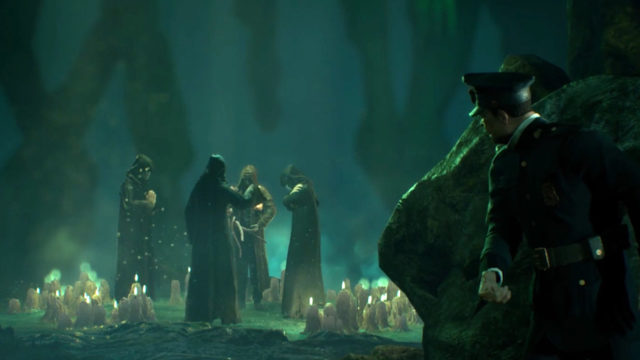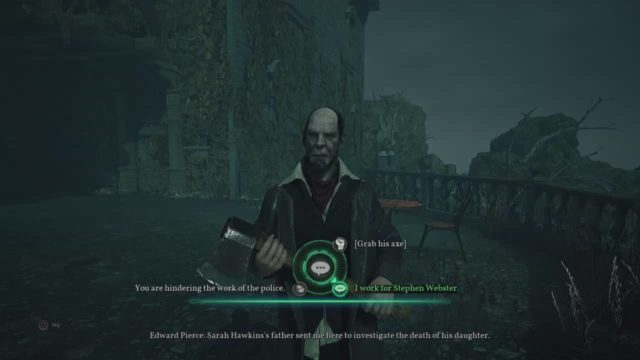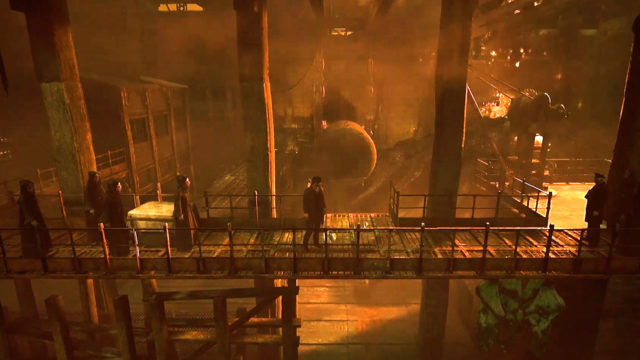Compelling story and world; atmospheric visual and sound design; core exploration and investigation mechanics feel great; good replay thanks to various dialogue and character build options
Some secondary gameplay is underdeveloped; a little more visual, technical, and audio polish required; design clearly favors certain character builds over others
While I wouldn’t call myself a hardcore H.P. Lovecraft fan, I definitely have an appreciation for the famous author’s work, having read several of his stories and consumed plenty of media influenced by his brand of cosmic horror. Of course, the writer’s work has spread into the realm of gaming before, with several games directly pulling from his oeuvre and others using his style as inspiration, such as the classic GameCube horror title Eternal Darkness: Sanity’s Requiem. Cyanide’s Call of Cthulhu is obviously mostly the latter, as it takes its title from Lovecraft’s most famous story while not directly adapting the plot. Thankfully, it manages to mostly do that work and its creator justice.
In the game, you assume the role of private detective Edward Pierce, a World War I veteran stricken with nightmares and insomnia due to his experiences in battle, and he’s not doing too well. His afflictions are problematic enough, but they are combined with a drinking problem and general malaise from his boredom at “solving” the same old cases over and over again, usually involving a jealous husband. But that changes with the arrival of Stephen Webster, a wealthy businessman whose artist daughter, Sarah, recently died in a fire alongside her husband and child. The police ruled the cause as a simple domestic dispute, but he expects there is more going on after receiving a painting from her around the time of her death; it depicts her, a monstrous figure, and seemingly occult symbols. This proves more than enough to pique Pierce’s interest, and he agrees to head off to the seemingly forgotten island of Darkwater where Sarah and her family lived a secluded life.
The setup is classic for many a great mystery tale and it helps set the tone of things to come exceptionally well, which is extremely important given the fact the story and atmosphere are clearly the driving force. It’s all reinforced even more strongly when you arrive on the dark and misty island and start to see how its past and present set the stage for things to come. Darkwater was once a thriving whaling town in the American North East, but those days are long gone as the island and its depressing residents struggle to get by. All that really seems left are one boat that connects the island back to mainland, a gang of bootleggers who have established an intimidating presence, and the local asylum that plays host to a doctor well known and respected for his experiments and medical breakthroughs. Sarah’s art, along with her husband’s wealth, used to be significant as well, but all that remains is their partially burned mansion perched atop the hill overlooking the town. All of this you learn within the first 30 or 40 minutes, so it quickly becomes clear that there’s a lot going on in this story and, if you’re like me, it’s all very intriguing and makes you wonder how everything will come together.

You’ll see how things progress, but first you actually have to play the game, which is really rooted in exploration with deviations made into a variety of areas including puzzle solving and stealth among other mechanics. Call of Cthulhu is divided into chapters with most presenting a new location you’ll need to explore for the clues needed to progress the plot; a handful are fairly linear progressions while others serve as small sandboxes. Some information is critical to moving things along, but there are plenty of extra details that aren’t necessary but might open additional dialogue options or just provide extra context for the world. Occasionally, you’ll enter areas where Pierce can enter a special sort of vision that allows him to reconstruct certain moments, or a series of events, that occurred in a particular location. These play out in a very directed manner that doesn’t allow for any real player agency beyond looking for the next thing you need to interact with, but they at least serve as a visually interesting way for stressing certain plot points.
For the most part, these portions of the game are very well constructed. Occasionally the plot’s vital clues can be easy to overlook, resulting in some annoying back and forth combing for details, but for the most part they are hidden just well enough to make them rewarding to find while not killing the flow. Delving deeper into each area for every little detail is a little more work, but the world, characters, and events are interesting enough that I always found the effort worthwhile. You’ll often use this information during conversations and having that extra information often unlocks new conversation options that can present you with yet more information, or even entirely new options for completing certain tasks. This is also where the game’s RPG mechanics come into play.
Call of Cthulhu is actually based on the tabletop RPG of the same name, and it takes some inspiration from it for its stats system; it even calls the screen where you manage your experience, or Character Points, your “Character Sheet.” Accomplishing objectives earns you these points that you can invest in a number of stats: Eloquence, Spot Hidden, Strength, Investigation, and Psychology. Two other stats, Occultism and Medicine, can be upgraded via a pool of Character Points you receive at the start of the game, but mostly you’ll need to find appropriate books throughout the game to level them up. These attributes affect a number of ways you can interact with the world as well as the characters within it. For example, an exceptionally strong Pierce might be able to brute force his way through certain obstacles as well as intimidate uncooperative individuals while a high Occultism level might enable you to better understand ancient artifacts you come across. Unfortunately, this system also presents one of the game’s flaws, because it doesn’t really do enough to reward investment in all of the options as some statistics are much more useful than others. Yes, the ability to flex your muscles and scare people into cooperating with you does prove useful, but putting more points in Eloquence is ultimately much more useful as you much more frequently have the opportunity to sweet talk people into giving you the information you need.

The game’s efforts to add more gameplay variety offer a similarly mixed bag. While most of the game is focused on exploration and investigation, you are occasionally presented with moments where stealth and even combat are required and these mechanics aren’t that well developed. One level about a third into the game is very heavily stealth focused, which generally just means crouching and waiting behind covers for guards to move past you in their pre-programmed routes. In the event you are spotted, a white indicator will appear over your enemies to indicate they are suspicious, and then it will turn red to show they are actively pursuing you. Thankfully, a quick run around a few corners is generally enough to make them lose interest and go back to their normal routine. You can choose to hide in closets as well, but they were very rarely ever necessary. There are moments one could consider boss fights, but they were actually pretty simple, although the first one is a little unclear with what exactly you need to do, even though you are at least prodded toward the right direction. The second is more straightforward and better defined, but as a result it’s a bit less challenging.
Puzzles occasionally pop up as well and they generally fare a little better. Mechanically, they are all fairly simple and are often integrated with exploration and examination of your environment, which once again is where Call of Cthulhu fares very well. Often the task at hand can even be accomplished via multiple methods based on how you’ve invested your character points or previous actions you’ve performed. For example; in an early chapter I needed to get into a guarded warehouse. I could have given a bottle of whiskey to a few local drunks in return for them acting as a distraction, but I had previously angered the barkeep so he didn’t want to sell me anything. Instead, I had to hunt down the parts needed to fix a machine that would open up the pathways running beneath the warehouse. It’s little things like this, along with the extra dialogue options associated with certain stats or exploration, that help give the game some replay value.
With such a story-centric game, visuals are actually quite important, and I’d argue Call of Cthulhu is a hideous game in all the right ways. While I imagine the game looks more detailed on other systems or PC, the Switch game still captures the dark, dreary and grimy world it is trying to convey exceptionally well. I think much of this can be attributed to the attention to detail throughout the game as well as the brilliant, atmospheric lighting. The only real stumbling block comes down to character animations. Character faces are perhaps the one area where Switch’s lesser fidelity hurts the game and their general movements during conversations and some cutscenes just feel a little too stiff and unnatural. A nice plus, however, are the cutscenes which feature a nice bump up in quality thanks to their pre-rendered nature and, unlike some other games designed with more powerful systems in mind, these scenes don’t show the signs of aggressive compression for the sake of saving memory.

The sound design and music tell a similar tale as the visuals. Overall, they are quite good, though they stumble in the fine attention to detail. I played the whole game with headphones on and through the vast majority of the game, the experience was fantastic as the atmospheric music and sound effects hit the perfect pitch. However, you’d occasionally come across moments, both in gameplay and cutscenes, where things just felt off. For example, one character’s voice might echo appropriately for the large room they are in, but then the next sound effect or voice might not reflect that. Some sound effects just seem to be missing. The voice acting in general feels somewhat uneven as well, and the direction can be inconsistent, with a character being emotionally charged with one line and then perfectly even keeled the next. Thankfully, everything seems to be running just fine when it matters the most, but it still feels strange when a character will be comically stressing their New England accent in one scene, and then perfectly delivering an emotional reading later on.
Unfortunately, the review wouldn’t be complete without mention of a few technical issues. First of all, the game generally runs quite smoothly, though you will almost certainly notice some drops in framerate occasionally. Also, the game looks decent when playing in handheld mode, though character faces come across as especially blurry and there’s a generally grainy look to the whole thing, though some actually might find that look somewhat appropriate considering the nature of the game. Second, the load times between chapters are very, very, very long, though restarting after a fail state is very fast. Finally, I did experience some more serious issues, such as gameplay failing to resume after a cutscene and the game crashing at one point. Thankfully checkpoints are fairly frequent.
Having finished Call of Cthulhu and taken some time to think about it, I feel my opinions don’t necessarily match what one might consider an “objective” review, if such a thing can even exist. Yes, pretty much everything in the game is a little rough around the edges: deviations from the core exploration mechanics are often under developed, character animations often feel unnatural, and the sound design and voice acting can be inconsistent. However, even acknowledging all that, I was enraptured from beginning to end. The problems with presentation are overcome thanks to the strength of the moment to moment writing as well as the overarching story and the gameplay issues are only small problems as the game never takes too long to dwell on these mechanics and the punishment for failure is never severe, often resulting in just a few lost minutes. Ultimately, it feels like the developers at Cyanide knew the strengths of the game, but still wanted to add a bit more variety while still not distracting from the core experience which I found incredibly fun and compelling. One more round of fine tuning in just about every area of the game would have been beneficial, but I still thoroughly enjoyed the game.
Nintendojo was provided a copy of this game for review by a third party, though that does not affect our recommendation. For every review, Nintendojo uses a standard criteria.




 ShareThis
ShareThis





